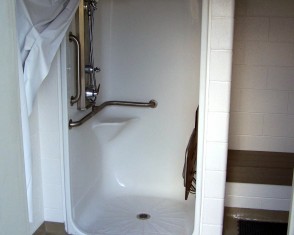Let’s talk about the importance of handicap showers
Accessible showers, also known as handicap showers, aren’t just for people with disabilities. With age comes mobility issues, which is explains the increasing popularity of incorporating accessible showers in bathroom renovations.
We are living longer than ever. As people age, most want to live independently and in familiar surroundings — usually their own homes — for as long as possible. Inherent in this desire is the freedom to come and go as one pleases, enjoying the people, places and things one prefers. Facilitating aging adults’ ability to remain in their homes by providing solutions like wheelchair showers, has physical, psychological, and even financial benefits for both them and their loved ones.
Many seniors have proactively planned for the future, in terms of anticipating the supports they may need. Living near loved ones can ensure help with driving to appointments and doing errands or receiving assistance with housekeeping. However, it is actually the smaller day-to-day things that end up frustrating one’s independence.
Fragility, illnesses or disease don’t always render someone unable to care for themselves, but rather it’s the functional consequences of these issues—such as standing up to cook, or lifting a leg over a tub wall in order to bathe, that most impair seniors.
Handicap showers can be an important component in ensuring that personal care challenges are not a hindrance to staying in the home. Studies have linked home modifications such as wheelchair showers to overall better health in our aging population.
Physical health directly impacts one’s psychological health. Promoting mental health in our elderly loved ones means not only helping them remain in their accustomed surroundings, but also helping them feel at ease functioning there. The bathroom is one of the most challenging rooms of the house in which to promote safety. Many offer limited room to manoeuver, and wet floors and hard surfaces further increases risk of serious injury.
Keeping One’s Dignity Shouldn’t be a Handicap
Wheelchair-accessible handicap showers ensure that both peace of mind and dignity are maintained while bathing. Adapting a home for independence and accessibility also allows for seniors to continue to enjoy their own sentimental or prized possessions, maintain routines, remain with their pets, and stay connected with family and friends — all of which mitigate stress and promote a longer life.
It is true that creating an accessible home does have both technical and financial challenges. Bathroom renovations and handicap shower installations may not be cheap, but it is important to remember that neither are the alternatives.
Assisted living or nursing homes involve their own significant long-term expenses, often making practical home renovations more logical for some — especially if one’s own home is already paid for. The cost of a wheelchair shower as opposed to a permanent move is not comparable; the comforts of home are priceless.
Handicap showers make it easier for seniors to stay in their own homes and nets a positive impact on quantity, and perhaps even more important, quality of life. Quite simply put, they are happier.



